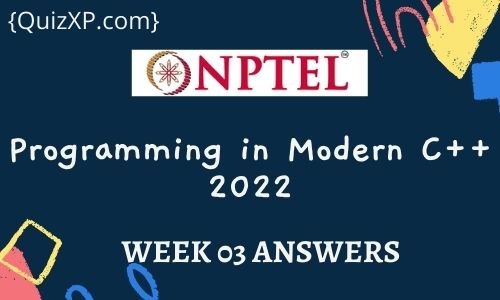Are you looking for the Answers to NPTEL Programming in Modern C++ Assignment 3? This article will help you with the answer to the National Programme on Technology Enhanced Learning (NPTEL) Course ” Programming in Modern C++ Assignment 3 “
What is Programming in Modern C++?
There has been a continual debate on which programming language/s to learn, to use. As the latest TIOBE Programming Community Index for August 2021 indicates – C (13%), Python (12%), C++ (7%), Java (10%), and C#(5%) together control nearly half the programming activities worldwide. Further, C Programming Language Family (C, C++, C#, Objective C etc.) dominate more than 25% of activities. Hence, learning C++ is important as one learns about the entire family, about Object-Oriented Programming and gets a solid foundation to also migrate to Java and Python as needed. C++ is the mother of most general purpose of languages. It is multi-paradigm encompassing procedural, object-oriented, generic, and even functional programming. C++ has primarily been the systems language till C++03 which punches efficiency of the code with the efficacy of OOP.
CRITERIA TO GET A CERTIFICATE
Average assignment score = 25% of the average of best 8 assignments out of the total 12 assignments given in the course.
Exam score = 75% of the proctored certification exam score out of 100
Final score = Average assignment score + Exam score
YOU WILL BE ELIGIBLE FOR A CERTIFICATE ONLY IF THE AVERAGE ASSIGNMENT SCORE >=10/25 AND EXAM SCORE >= 30/75. If one of the 2 criteria is not met, you will not get the certificate even if the Final score >= 40/100.
Below you can find the answers for NPTEL Programming in Modern C++ Assignment 3
NPTEL Programming in Modern C++ Assignment 3 Answers:-
Q1. Consider the following program. Fill in the blanks as per the instructions given below:
- at LINE-1 with appropriate initialization block to initialize the data members,
- at LINE-2 with appropriate definition of the destructor to free the memory allocated for
- the data members,
- at LINE-3 and LINE-4 with appropriate definition of the functions getX() and getY(),
such that it will satisfy the given test cases.
Code:-
#include<iostream>
using namespace std;
class point {
const int *px, *py;
public:
point(int x, int y) : px(new int (x)),py(new int(y)){} // LINE-1
~point() { delete px;delete py; } // LINE-2
int getX() { return *px; } // LINE-3
int getY() { return *py; } // LINE-4
};Q2. Consider the following program. Fill in the blanks as per the instructions given below:
- at LINE-1 with appropriate declaration of data member z, and
- at LINE-2 and LINE-3 with appropriate header of the functions calulateZ() and print(),
Code:-
#include<iostream>
using namespace std;
class myClass {
int x, y;
static int z; // LINE-1
public:
myClass(int x_, int y_) : x(x_ * x_), y(y_ * y_) { }
void calulateZ() const{ z = x + y; }; // LINE-2
void print() const { // LINE-3
cout << "x = " << x << ", y = " << y << ", z = " << z;
}
};
int myClass::z=0; ???? Next Week Answers: Assignment 04 ????
Q3. Consider the following program. Fill in the blanks as per the instructions given below:
- at LINE-1 with appropriate header for the copy constructor,
- at LINE-2 with appropriate header for the copy assignment operator,
- at LINE-3 with appropriate condition
Code:-
#include<iostream>
#include<cstring>
#include<cstdlib>
using namespace std;
class employee {
int eid;
char *name;
public:
employee(int eid_, const char *name_) : eid(eid_), name(strdup(name_)) { }
employee(const employee &e) : eid(e.eid), name(strdup(e.name)) { } // LINE-1
employee& operator= (const employee &e){ // LINE-2
if (this != &e) { // LINE-3
free(name);
eid = e.eid;
name = strdup(e.name);
}
return *this;
}For other courses answers:- Visit
For Internship and job updates:- Visit



